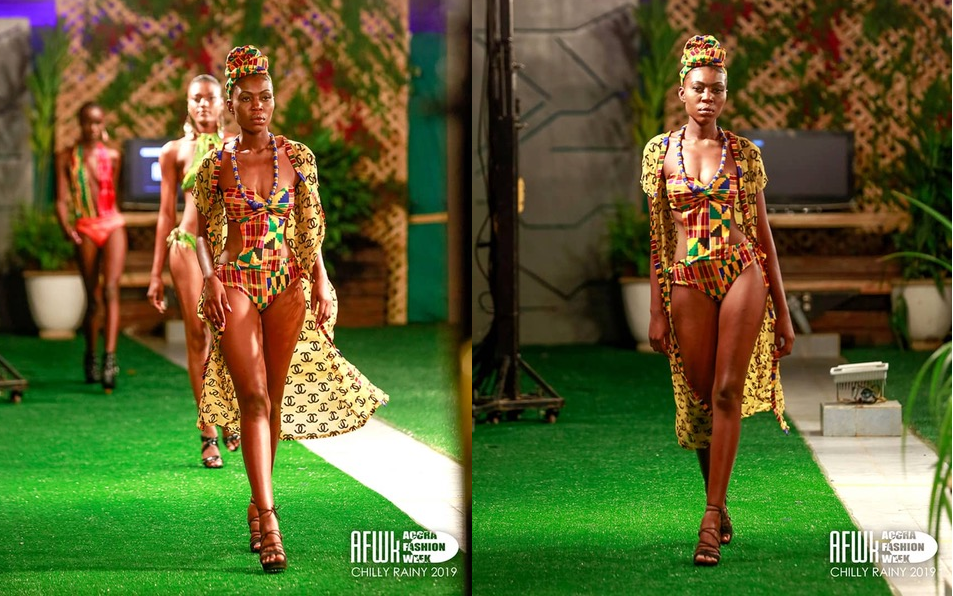 The Kente cloth you see in the below picture originates from Ghana, West Africa. Modern Kente is characterised by intricately woven and richly colourful geometric designs. You are most likely to see it in bold shades of yellow, blue, green, red and orange. It is associated with the Ashanti people in central Ghana and is linked with special occasions as it is expensive to make. However, in recent years, counterfeit goods (especially from China), border inefficiencies and rising costs have hit the local Kente-making industry hard. Nevertheless, more and more fashion brands are making sure they source their Kente from locally-sourced textile companies.
The Kente cloth you see in the below picture originates from Ghana, West Africa. Modern Kente is characterised by intricately woven and richly colourful geometric designs. You are most likely to see it in bold shades of yellow, blue, green, red and orange. It is associated with the Ashanti people in central Ghana and is linked with special occasions as it is expensive to make. However, in recent years, counterfeit goods (especially from China), border inefficiencies and rising costs have hit the local Kente-making industry hard. Nevertheless, more and more fashion brands are making sure they source their Kente from locally-sourced textile companies.
Ebony By Bernice is one of those brands. The swimwear brand claims that it only obtains its materials from manufacturers who advocate environmentally-friendly production. It also aims to empower local woman. And, it turns its leftover fabric into colourful scrunchies, earrings, rings, facial pads, and headbands, among other things (which is typical of a Ghanaian company – nothing goes to waste).
Here, Bio Market Insights’ Liz Gyekye catches up with Bernice Boakye Dufie, CEO and Founder of Ebony By Bernice.
Bernice.
Liz Gyekye (LG): Welcome to 5 Minutes With. Please summarise your role and what you specialise in?
Bernice Boakye Dufie (BBD): Thanks for the opportunity. I’m Bernice the CEO and Founder of Ebony By Bernice (@ebonybybernice), an ethically-handmade swimwear brand made in Ghana.
LG: Before going into your current role, what did you used to do?
BBD: I used to work as a back-office executive in the hospitality industry.
 LG: How do you think fast fashion will be impacted by Covid-19?
LG: How do you think fast fashion will be impacted by Covid-19?
BBD: Well, customers are becoming conscious about the operations of brands in the industry, asking for transparency on a frequent basis. Therefore, I think you will start seeing a shift from fast fashion to slow, sustainable, ethical fashion.
LG: What advice would you give to somebody starting out?
BBD: To believe in their projects, to have faith and be their first fan. These times are trying and unpredictable but I strongly believe this is the right opportunity for meaningful, positive impactful businesses. There is no better time to make a difference!
LG: What are your views on ethical/sustainable fashion?
BBD: According to the United Nations Conference on Trade and Development (UNCTD), fashion is the second worst pollution industry for carbon emissions and natural resources depletion. It is also one of the few industries that uses child labour, forced labour and modern slavery (we can see from what is happening in Xinjiang, China right now). As a result of this, there is an urgent need for the fashion industry to stop the ‘business as usual’ approach and shift to a more sustainable, ethical model.
LG: Are you seeing more of demand for organic/sustainable materials? 
BBD: There is new research that shows how people don’t want to go back to how it was pre-pandemic and expect brands to be more sustainable. Maybe the research is over-optimistic, but I do detect some changes in consumer preferences as people reassess their life choices.
LG: What one thing would you like the fashion/textile industry to do better and why?
BBD: Transparency! I think there should be a huge demand of transparency because it is the key, it builds trust, reputation, it is one of the strongest ways to gain trust and loyalty. Brands must make sure that complete information is available for their customers to help them make well informed decisions during purchasing.
LG: What’s your favourite sustainability product?
BBD: Swimwear, I’m kidding! Being a great fan of sustainability, I embrace all sustainable products, indeed I appreciate a lot how companies are integrating sustainability into their businesses and how they are investing in research and development. Bamboo clothing is a good example of how things are changing and part of the evidence that there is going to be a great opportunity for sustainable and ethical brands.
 Are you interested in sustainable fashion? If so, you may also be interested in reading the below…
Are you interested in sustainable fashion? If so, you may also be interested in reading the below…
Read: 5 Minutes With… Jonah Mwangi from Green Nettle Textile.
Read: 5 Minutes With…Georgia Parker from Fashion for Good.
Read: 5 Minutes With…Hamilton Perkins from Hamilton Perkins Collection.
Read: Fashion industry to undergo “transformative” decade in bid to improve its sustainability.
Read: Bio-leather made from apples – one of the 15 start-ups aiming to change fashion.





